On the outskirts of the capital of the Central African Republic there is a school that was founded by members of the Focolare Movement. Today it welcomes more than 500 children, many of whom have missed out on many years of education because of long periods of war.
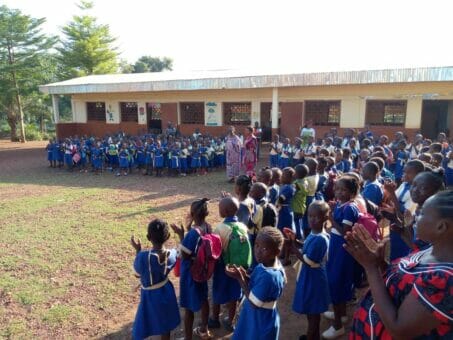 We are in Bangui, capital of the Central African Republic, a landlocked state in the interior and central part of the African continent. The capital is located in the south-west, in an area that borders on the Democratic Republic of Congo. Four years ago, a kindergarten and primary school called Sainte Claire was founded in a suburb of Bangui. It currently has 514 pupils. It was opened in response to an appeal that both Pope Francis and Maria Voce, president of the Focolare Movement at the time, had made: to go out to meet people’s needs, particularly those living on the margins of society.
We are in Bangui, capital of the Central African Republic, a landlocked state in the interior and central part of the African continent. The capital is located in the south-west, in an area that borders on the Democratic Republic of Congo. Four years ago, a kindergarten and primary school called Sainte Claire was founded in a suburb of Bangui. It currently has 514 pupils. It was opened in response to an appeal that both Pope Francis and Maria Voce, president of the Focolare Movement at the time, had made: to go out to meet people’s needs, particularly those living on the margins of society.
“For us the most urgent need was education,” explains Bernadine, a member of the Focolare and headmistress at the Sainte Claire school. “After long periods of war, many children had missed several years of school. We could then help them catch up and reach the level of their peers.”
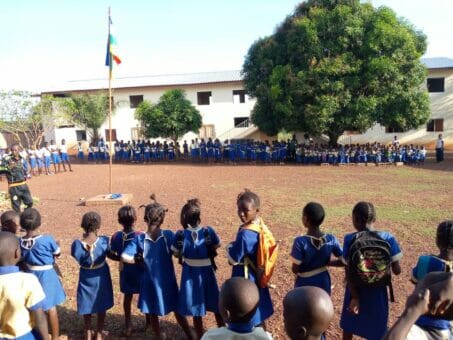 The school is located in a suburban neighbourhood and so has welcomed many children from families who had fled the city when the war had destroyed their homes. “They come here to start a new life – it’s like a rebirth,” Bernadine continues.
The school is located in a suburban neighbourhood and so has welcomed many children from families who had fled the city when the war had destroyed their homes. “They come here to start a new life – it’s like a rebirth,” Bernadine continues.
The Sainte Claire Institute is Catholic and, founded by members of the Focolare Movement, seeks to transmit teachings based on the culture of unity. The director explains: “Each day begins with morning prayers; then we throw the dice of love: on the different sides of the cube we read short phrases which help us live the day well. The next day, before rolling the dice again, we share the experiences of the day before. Some children helped their mother to wash the dishes, others made peace with a friend after a fight, …”
At the moment, the war in the country has been suspended and the political situation is more stable. However, there are still many consequences that have an impact on the population, including the curfew from 8pm to 5am. Then there are numerous complications related to economic and social factors. Bernadine explains: “A few days ago, for example, there was a big rainstorm that damaged the electricity cables. Since then we only have electricity for 2-3 hours a day. This changes people’s lives a lot – starting with food, which cannot be stored. Not to mention all those who work relies upon electricity: they haven’t been able to work at all!”
The pandemic has obviously effected our lives too. In 2020, the Sainte Claire institute had to end the year in March instead of June and this has had an impact on the education of the pupils who were once again left without a school. But the economic consequences for the whole country were also harsh: borders were closed and the Central African Republic, with no access to the sea, had difficulties with the delivery of goods from abroad. Prices have risen sharply.
Despite these current difficulties, the school’s activities have resumed During this year’s United World Week (1 – 9 May), the children helped prepare an area that will be used for activities by planting grass seeds for the lawn. In a few months time, this area will be used for a variety of sports.
Education, therefore, does not stop, not even in the midst of difficulties: it still allows new seeds of hope for a better future to be planted.
By Laura Salerno


 Italiano
Italiano Español
Español Français
Français Português
Português
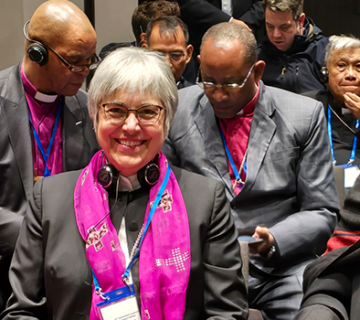
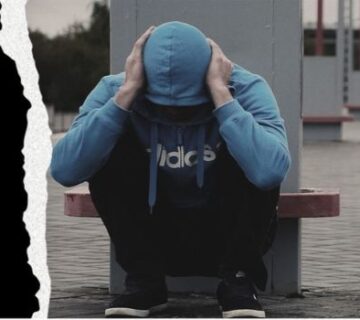
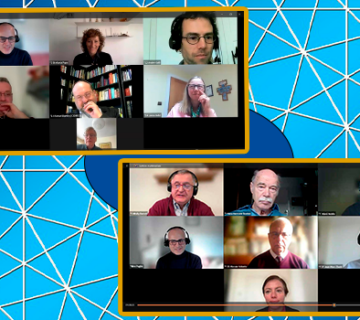

Grazie Laura!!! Sono portantissime le notizie di azioni positive!!!! Grazie della condivisione!!!! Betty
Grazie a Laura per farci conoscere questa realtà e auguri per la sua esperienza.